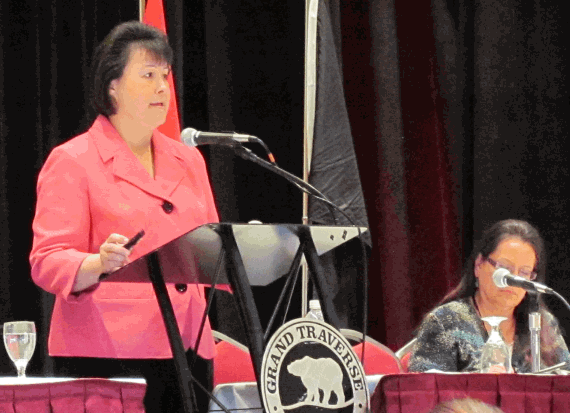
Levi Rickert, Native News Network
August 28, 2013
TRAVERSE CITY, MICHIGAN – Some 400 American Indian tribal leaders and health care professionals are meeting at the Grand Traverse Resort and Spa, owned by the Grand Traverse Band of Ottawa and Chippewa Indians, at the National Indian Health Board’s 30th Annual Conference.
“We are delighted to have nearly 400 tribal leaders, elders and health care colleagues engaged in the current health care reform issues that impact every single person in our families and communities. From the American Indian and Alaska Native benefits through the Affordable Care Act to the renewal of the Special Diabetes Program for Indians. It is important to be involved and informed on the policies that are improving health care services and accessibility to our tribal members,”
said NIHB Chairperson Cathy Abramson.
“We are pleased to have a number of federal agency representatives here today to provide this information, to answer our questions and to listen to our comments and concerns.”
On Tuesday, conference attendees heard from federal agencies that seek to improve health conditions in Indian country.
Indian Health Service
Dr. Yvette Roubideaux, acting director of the Indian Health Service, who provided an overview of the Affordable Care Act, leading up to the to the October 1st enrollment of the Insurance Marketplace of the Act.
“Meeting with tribes and tribal organizations, such as the NIHB, is a very important part of our agency consultation efforts and IHS’s priority to renew and strengthen our partnership with Tribes. We value our partnership with NIHB as we work together to change and improve the IHS and to eliminate health disparities in Indian country,”
Dr. Roubideaux said.
Department of Veterans Affairs
The Department of Veterans Affairs partnered with NIHB to host the second Native veterans’ health workshop track at this year’s conference.
“We are committed to nurturing an environment that fosters trust and provides culturally competent care for Native American veterans, including creating culturally sensitive outreach materials, incorporating traditional practices and rituals into treatment and ensuring the best possible experience when Native American veterans receive care from the VA,”
said John Garcia, Deputy Assistant Secretary in the Office of Intergovernmental Affairs at the US Department of Veterans Affairs.
“We at the VA are further committed to working with and for tribal leaders on a nation-to-nation basis to address the many issues being experienced by veterans and their families across Indian country.”
Health Resources and Services Administration, US Department of Health and Human Services
Mary Wakefield, Administrator for the Health Resources and Services Administration said that under the leadership of the Health and Human Services (HHS) Secretary Kathleen Sebelius, one of the top goals is to improve health equity with Indian tribes.
“We want to eliminate health disparities among American Indians and Alaska Natives. And, we believe we can do that by working toward two other goals – to strengthen the health workforce by expanding the supply of culturally competent primary health care providers in Indian country and Alaska and to improve access to quality health care and services by increasing the number of health care access points,”
Wakefield said.
Substance Abuse and Mental Health Services Administration, US Health and Human Services
Mirtha Beadle, Deputy Administrator for Operations with the Substance Abuse and Mental Health Services Administration in HHS focused her speech on behavioral health issues stating that American Indian and Alaska Natives have the highest level of substance abuse and dependence and unmet need.
“The emphasis is growing on screening and early intervention services. Evidence based practices are an important shift for behavioral health. There is an increased need to focus on bilingual populations in the US. American Indians and Alaska Natives stand to benefit substantially from the implementation of the Affordable Care Act,”
Beadle added.
Office of Personnel Management
Susan McNally, Senior Advisor in the Office of Intergovernmental Affairs with the Office of Personnel Management (OPM) provided n brief overview of the health plans that OPM directs under the Affordable Care Act. OPM will work with private insurance to offer two state health plans – the Multi-State Plan and the Federal Employee Health Benefits program, which OPM has managed for nearly 40 years.
The 30th Annual Consumer Conference continues today with a keynote address from Gold Olympic Medalist Billy Mills, updates from the Tribal Leaders Diabetes Committees and the Tribal Technical Advisory Committee to the Centers for Medicare and Medicaid Services and a panel discussion on the definition of Indian in the Affordable Care Act.
